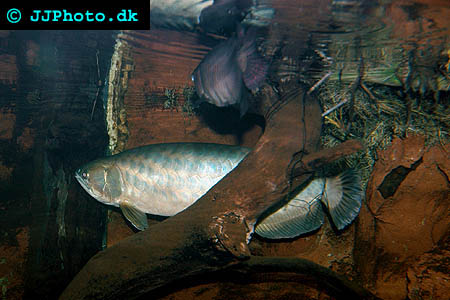Asian arowana bred in Bristol
First of, let me tell everyone how sorry I am that I have been posting a bit sporadic lately. Things have been crazy but hopefully they will improve even though it still might be a couple of weeks until they do. Until then you will unfortunately have to be content with the host I do manage to post. But now, without further ado, on to the Asian arowana
Asian Arowana – Scleropages formosus. Copyright www.jjphoto.dk
Bristol Zoo Gardens have bred the rare Asian Arowana (Scleropages formosus). The spawning resulted in 15 fry which are now estimated to be nine weeks old. The staff did not witness the spawning which is why they can only estimate the age of the fry for this mouth-breeding species. It is not the first time the Asian Arowanas have spawned in Bristol Zoo Gardens, but it is the first time the fry have survived.
Bristol Zoo Gardens has kept four Arowanas, also known as Dragon fish, for 13 years. They received the specimens from the UK custom services who had confiscated them after revealing an attempt to smuggle them into the country.
The zoo has recently taken steps to improve the Arowana exhibit by using reverse osmosis, and has also increased the temperature in the holding tanks. The assistant curator of the aquarium at Bristol Zoo Gardens, Jonny Rudd, believes that one of these actions might be the reason behind the successful breeding. This might very well be true but I also wish to mention the possibility that it might simply have to do with the parents getting more mature and learning from past failures, a well known phenomenon in mouth brooding fish and other fish that care for their young.
This is as far as I know the first time this species have been bred outside Asia.
The Asian Arowana is very rare in the wild and is on the brink of extinction in Thailand. It is red listed by Cites and can not be imported to many countries. This species is bred in farms in Asia where it is a popular exclusive aquarium fish, believed to bring luck due to its resemblance to a dragon. It is today available in a variety of different colorations and morphs. In Asia you can by farm bred fish with certifications stating that they are farm bred and not wild caught, and some countries allow you to import such specimens. You can read more about the Asian Arowana here.
